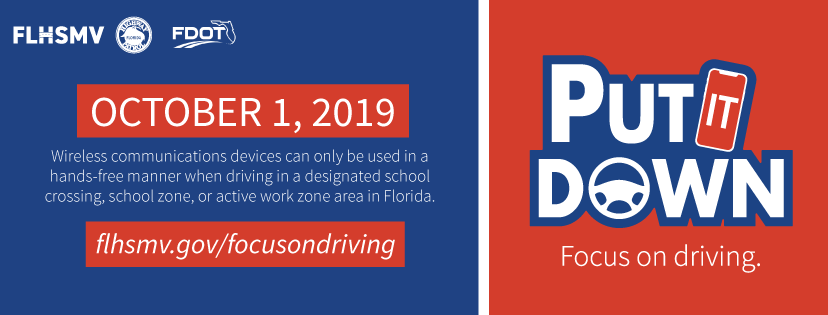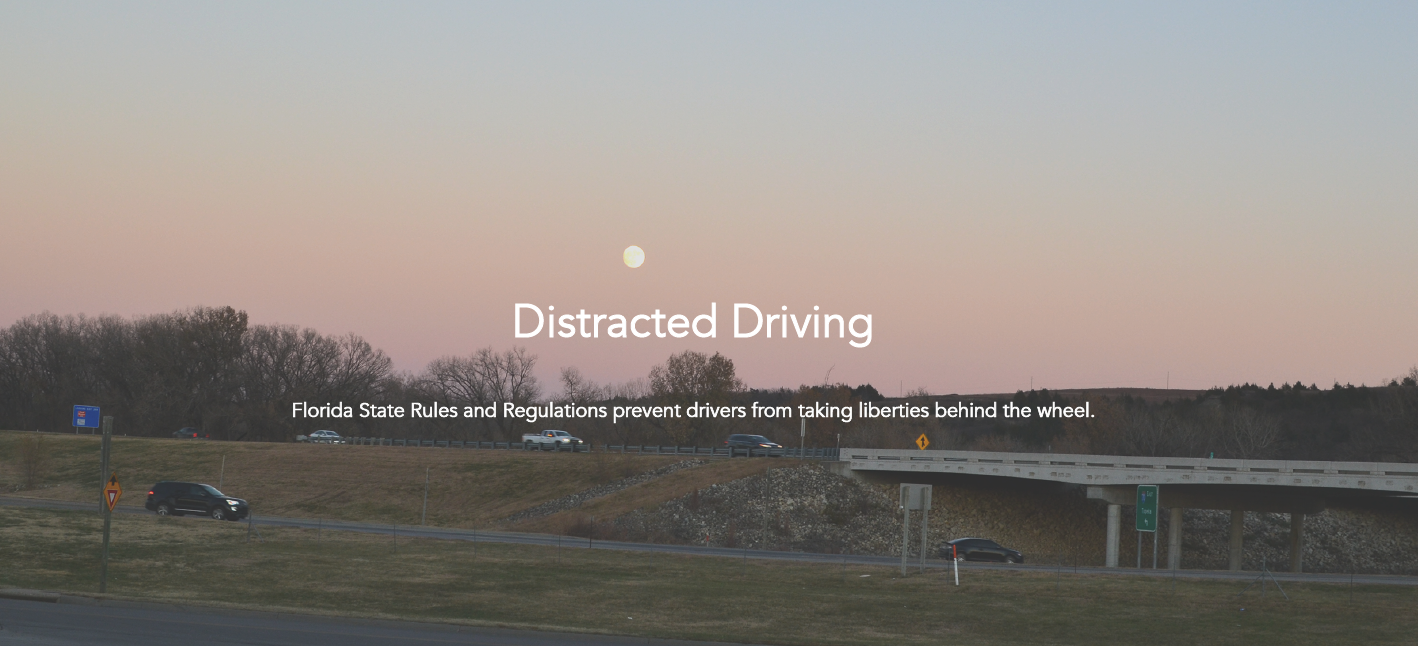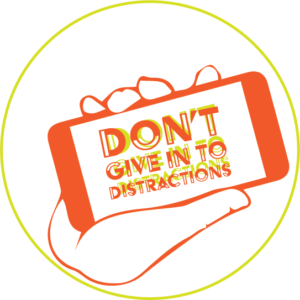Distracted Driving
Stop Distracted Driving
FLINSCO.com knows how important it is for drivers to save money on auto insurance. This is why it is imperative to uphold laws that help keep your eyes on the road.
Notification sounds, abrasive radio hosts, other drivers road raging, all potentially lead to your demise. Rate increases are truly the least of your worries, and they will happen.
Before you reach for that “skip” button on the stereo while in motion, think about how badly you could harm your vehicle, yourself, your passengers, and the other people and property with whom you share the road.
Too Texty: Handheld Phone Use Laws
All across the country, laws are in place to discourage drivers from text messaging while driving. It’s one of the greatest potential causes of a crash, and therefore is banned in 48 states and the District of Columbia.
Florida driving laws prohibit texting and driving. Additionally, handheld cellphone use is partially restricted, banned for drivers in work and school zones.
Florida does not ban cellphone use by young drivers, yet 38 other states have regulations in place to keep drivers with intermediate licenses and learners permits from using their phones while driving.
According to research studies, it’s actually not clear whether or not the laws in place are effective. At least not yet.
The Insurance Institute for Highway Safety (IIHS), an independent, nonprofit scientific and educational organization attempting to limit losses from auto accidents, reviewed 11 studies of the impact of all-driver handheld phone bans with mixed results.
Unfortunately, it’s too soon to tell whether these laws limiting drivers’ use of mobile devices will truly lower the risk of a crash. There is no reason to think they are not helping, however.
We must make efforts to protect ourselves and all sharing the roads from scatterbrained driving. Firm regulations are a great start.
Fighting Fire with Fire: Designing Tech to Reduce Distractions
We all know that technology, from SMS to apps to email, is buzzing with potential risk. As mentioned above, it’s illegal to use a handheld device in almost every U.S. State while driving.
So how do we best address this problem? Fight fire with fire. Or fight tech with tech, rather.
Experts are researching and testing technology to reduce the immense level of distraction caused by technology, and other common side-tracking activities, events, and physical states.
Crash prevention technology is in the works to lower the risk of accidents related to any type of distractions. Car manufacturers are working to create warnings to recenter the driver’s attention on the road if distracted, inattentive, or drowsy driving is sensed.
Certain systems work to avoid the accident completely if a driver does not respond quickly enough or at all. Drivers and passengers are already benefitting from bluetooth options to connect to vehicle entertainment and communication systems.
That process in and of itself is a bit distracting and time consuming! Again, it is necessary to stay alert and pull over as needed to establish safe, focused driving habits.

Florida’s Wireless Communications While Driving Law
Section 316.305 Florida Statutes permits police to stop drivers and give citations for text messaging while driving. It is prohibited to manually type or enter multiple characters into a mobile device to text, email, or instant message someone.
The only exception? Your car must be parked and turned off if you intend to use a handheld device while you’re inside. A few other exceptions are written in the law.
You are exempt from the law if you are a driver who is:
- Operating an authorized emergency vehicle and conducting official business. Police, Fire Department, and Emergency Medical Services Professionals are included in this group.
- Reporting a suspicious activity, emergency or crime to the police.
- Receiving messages related to navigation or operation of the car.
- Receiving messages related to safety, such as traffic, weather, or emergency alerts.
- Receiving data used primarily by the motor vehicle, or radio broadcasts.
- Using a device or system in a hands-free navigation mode.
- Communicating wirelessly without reading text messages, except to activate, deactivate, or initiate a feature or process.
- Communicating with another person wirelessly without manually inputting characters, multiple numbers, symbols or letters.
- Operating an autonomous vehicle in autonomous mode.
The following Section 316.306 says no to using wireless communication devices in school and work zones. No one is legally permitted to drive in a school crossing zone or school zone. Driving and using a handheld communication device is also off-limits in a construction area where workers are present or using equipment.
There are also exceptions to this rule. These include:
- Using a wireless communications device hands-free, or in a voice-operated mode. This includes bluetooth devices, both factory and after-market.
- Using a device hands-free for navigation.
- Operating an authorized emergency vehicle and conducting official business. Police, Fire Department, and Emergency Medical Services Professionals are included in this group.
- Reporting a suspicious activity, emergency or crime to the police.
- Receiving messages related to navigation or operation of the car.
- Receiving messages related to safety, such as traffic, weather, or emergency alerts.
- Receiving data used primarily by the motor vehicle, or radio broadcasts.
Distracted Driving Defined in Florida
In Florida, the law clarifies that anything taking your hands off the wheel, eyes away from the roadway, and mind off of the task at hand qualifies as distracted driving.
It puts everyone at risk, and the damage from taking that risk can cost you a fortune.
The State offers a few different categories of driver distraction, including:
Visual Driver Distraction
Removing your eyes from the road.
Manual Driver Distraction
Removing your hands from the steering wheel.
Cognitive Driver Distraction
Directing your attention anywhere other than the activity of driving.
Research Studies
2018 Distracted Driving Crashes by Troop
2018 Distracted Driving Crashes by County
2018 Distracted Driving Crashes by Type of Distraction
2018 Statewide Distracted Driving Citations by County
2018 Statewide Distracted Driving Citations by Issuing Agency
References:
- IIHS. (2019, May). Distracted Driving. Retrieved from: www.iihs.org/topics/distracted-driving#cellphone-laws.
- FLHSMV. Put it Down: Focus on Driving. Retrieved from: https://www.flhsmv.gov/safety-center/driving-safety/distracted-driving/

